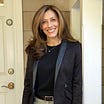This essay is part of a new collection of work inspired by the anthology On Being Jewish Now: Reflections of Authors and Advocates. Want to contribute? Instructions here. Subscribe here.

On October 6, 2024, I attended my first Tashlikh service. It was a local ceremony on the beach in Santa Monica, in honor of the victims of October 7. As I stood among the crashing waves, the emotion that came over me was fear. I took a deep, cleansing breath, raised a small stick over my head, and threw it into the ocean: a symbolic release. In that moment, I realized how much fear was still trapped inside my body. 364 days had passed, but in many ways, I remained frozen.
Fear keeps us silent. Healing is possible only when we find our voice, and when we come together. Standing on the water’s edge that night, I let go of my fear and returned to my friends on the beach. This year has taught us that community is our greatest blessing. None of us wants to live in a world that condemns our existence. We’ve been here too many times to think that hope alone will save us.
What has changed since 1945? That’s the year my grandparents were liberated from the concentration camps. They moved on physically, but I’m not sure they could ever again feel the full range of human emotions. They didn’t have the tools to heal their trauma. My grandmother never spoke about her experience of the Holocaust. She couldn’t bear to relive it.
War steals everything. It takes your loved ones and your sense of safety, forces you into a state of hypervigilance. This unease is baked into my bones. Generational trauma is real. I avoided my feelings for most of my life.
I have done years of healing work, but after October 7, I wrestled with overwhelm. I felt enormously guilty for enjoying simple privileges, like a shower or a glass of clean water, that the hostages no longer had. Every single day, I still struggle with this. I wake up, meditate, and give thanks for my safety and freedom. I wrestle with the fear of staying silent and the fear of speaking up. It’s a dance between the chains of my past and the knowledge that I can make new choices.
In the face of Hamas, I have no choice but to rise up and claim my identity. I have no choice but to rise up and say: Never again, not my people, not this time. I may not be the loudest voice in the room, but I’m out there, fighting my instinct to freeze. Generational trauma doesn’t have to control our lives. We can give it power, or we can become empowered.
Being Jewish right now is a contradiction. It’s living between fight and flight, between fear and bravery, darkness and light, isolation and community, hate and hope. It’s real conversations about our collective trauma—and the collective trauma of other nations. It’s hurt people hurting people, and asking ourselves how to heal the world. We are guilty of perpetuating the same patterns that have been repeating for centuries. We are all frozen in time. We heal the collective one person at a time, and facing my fear is a step in that direction.
After Tashlikh, I worked up the courage to attend the Nova Exhibition. It was uncomfortable at times, but it felt healing to hold space for the beautiful souls that had gathered to celebrate peace, music and community. To bear witness to their lives. May their memory be a blessing, and may we all find a path to healing our collective pain.
Laurie Seidman is a seasoned television executive and producer with nearly 30 years in the entertainment industry. In her free time, she focuses on writing, personal development, holistic health, yoga, and meditation. Additionally, she serves on the advisory board of The Cause Connection, a non-profit that supports local non-profit organizations in Los Angeles.
Instagram: @laurieseidman
This essay is part of a new collection of work inspired by the anthology On Being Jewish Now: Reflections of Authors and Advocates. Want to contribute? Instructions here. Subscribe here.




Thank you so much for writing about your feelings and doing the work that it takes to deal with our past and to learn how to work on the future. It is important work and your letter is very motivating. I will certainly give thought as to how I could do more.
Thank you again. Your loving Aunt and proud Aunt Riva.
Amazing